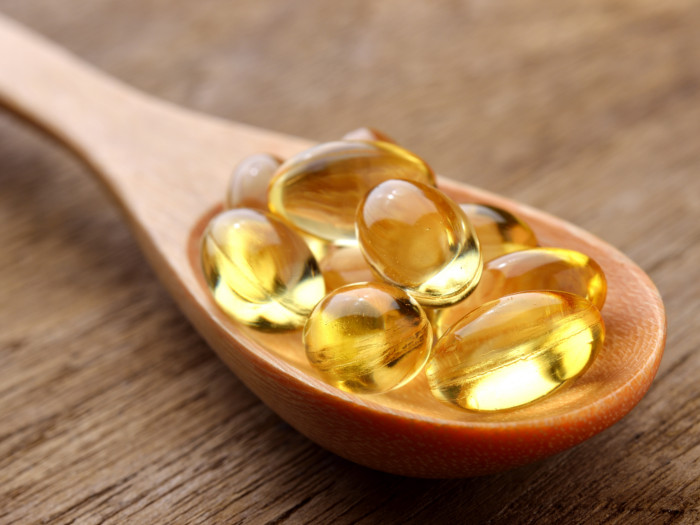Fish oil is widely touted as an excellent source of omega-3 fatty acids. Omega-3 fatty acids have multiple health benefits, including lowering your risk of heart disease, alleviating depression and menopause, and reducing the risk of Alzheimer’s disease. However, if you’re one of the many people with a fish allergy, or you are a vegan or a vegetarian, just select a fish oil substitute from the list below and keep your omega-3 levels up to the mark!
List of Fish Oil Substitutes
The best fish oil substitutes include omega-3 eggs, plant-based foods, canola oil, flaxseeds, chia seeds, and leafy vegetables. [1]
Omega-3 Eggs
These are eggs that have been fortified by feeding flaxseeds to the chickens. Besides seafood, omega-3 eggs are the only other whole food that contains biologically active DHA and EPA fatty acids.

If you don’t eat a lot of oily fish, taking a fish oil supplement could help you get enough omega-3 fatty acids. Photo Credit: Shutterstock
Plant-Based Foods
Vegetables and other plant-based foods contain alpha-linolenic acid (ALA), which the body partially converts into DHA and EPA. One of the best sources of ALA is flaxseed oil. You can also add whole flaxseeds to salads, cereals, and bread. [2]
Flaxseed
Flaxseeds are a close fish oil substitute for those wanting a vegan option. Flaxseed oil, too, is a rich source of omega-3 fatty acids like eicosapentaenoic acid (EPA) and docosahexaenoic acid (DHA). Moreover, it also consists of the plant-based omega-3 acid alpha-linolenic acid (ALA), thereby boosting your health in many ways.
Canola Oil
Canola oil is derived from the rapeseed plant, and is another source of ALA, containing both omega-6 and omega-3 fatty acids. It is also high in monounsaturated fats, which can lower your risk for heart diseases. One tablespoon serving of canola oil contains roughly ten percent of your daily ALA. However, this oil is high in calories, therefore should be used in small amounts.
Dark Leafy Greens
Green leafy vegetables like kale and spinach not only have protein and ALA fatty acids, but they are also packed with vitamins and minerals. 2 cups of these veggies a day will give you roughly half your recommended omega-3 intake, plus plenty of other health benefits. [3]
Walnuts
A quarter cup of raw walnuts will give you about 14% of your daily ALA, as well as manganese, iron, selenium, and other essential minerals. However, like all nuts, walnuts are a high-calorie, high-fat snack, so they are best when used as part of a comprehensive omega-3 diet.
Chia Seeds
Chia seeds are a rich source of omega-3 fatty acids like ALA and therefore, are a great fish oil substitute. Add them to your salads or sandwiches for a healthy boost.
Soybeans
Soybeans and tofu provide roughly 7% of your daily required intake of ALA per tablespoon of soybean oil or half-cup serving of tofu.
Omega-3 Supplements
Supplements do not always perform as well, or show as many benefits, as getting your omega-3s from foods in which they occur naturally. There are many foods that are now fortified with omega-3s such as milk and juice. DHA supplements made from algae are also available, but the amounts of omega-3s are often lesser than those found in fish and eggs. [4]
